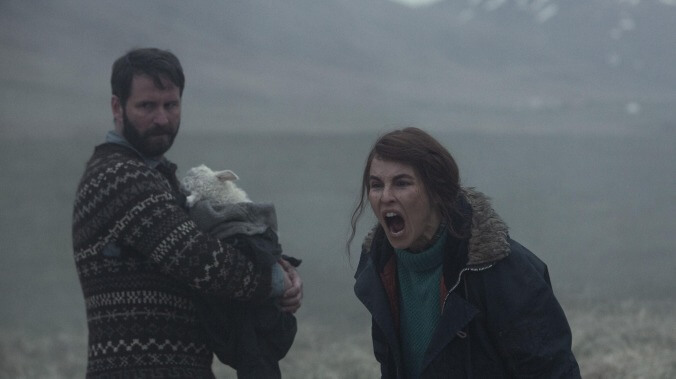Lamb is as much a strange domestic drama as an A24 horror movie
Noomi Rapace is excellent in yet another genre-movie exploration of grief and parenthood


For anyone who sees the successful indie studio A24 as an insufferably curated brand, with periodic issuances of “A24 horror” as their showpiece moneymakers, Lamb may look like unconscious self-parody—like a snoozy, less scary spinoff of The Witch, an Annabelle to that movie’s Conjuring. And true enough that Lamb is not as frightening as The Witch; for long stretches, it’s not especially frightening at all. It’s also yet another horror (or horror-adjacent) movie that could be described as being about—let’s say it together like good marketing students—grief and trauma. Yet this intimate, four-character film has its own quiet rhythms, compatible with yet distinct from any perceived A24 house style. It’s a hybrid of unnerving, dread-based horror and genuine domestic drama. Are they naturally so different, anyway?
The movie, divided into three chapters, initially unfolds near-wordlessly. Couple María (Noomi Rapace) and Ingvar (Hilmir Snær Guðnason) go about their business on their farm in Iceland, tending to sheep in the endless daylight. Something hangs in the silence between them, and in their brief, idle breakfast-table chats. (There’s an exchange about time travel that feels particularly loaded, and perhaps a touch contrived because of its obvious subtext.) One of the pair’s farming duties involves the birthing of new lambs, which make their quivering first steps moments after being ushered out of the womb. But after one particular birth, María and Ingvar agree to take one of the new lambs into their home to care for it, wrapping the animal in blankets and bottle-feeding it, treating it as one of their own.
It’s easy enough to suspect the psychological reasons for this decision, which are all but confirmed when Ingvar retrieves a crib from their barn storage, with no small or grown children in sight or in their conversations. The couple’s more practical reasons for adopting this lamb as their own, however, are kept off-screen for a while longer, forcing the audience to trust the characters’ parental instincts. The fiercer side of those instincts emerge when the mother sheep bleats incessantly at the couple’s door, seemingly insisting that the lamb be returned to her care in the barn. María takes grim action. She will not be denied her new shot at parenthood.
Suffice to say that the special-effects background of first-time director Valdimar Jóhannsson comes into play, though the minimalist trickery here isn’t exactly at the Ex Machina level of miraculous near-photorealism. If Lamb’s crucial effects work feels caught between easy believability and something a bit more fanciful, not fully achieving either, that nonetheless fits the movie’s delicate mood. Jóhannsson dips into some deadpan comedy and avoids directly summoning dread, but neither of these decisions lessen the movie’s nagging tension. The director simply lets the uncertainty percolate. (“Should we be feeling dread?” an audience member might reasonably ask.)
The obligatory interloper for this makeshift family comes in the form of Pétur (Björn Hlynur Haraldsson), Ingvar’s brother, who blows into farm country near-penniless, seemingly booted unceremoniously from his ride. His skepticism about his brother’s new lamb, as well as some other gradually revealed issues, supply the necessary conflict. Yet in such a small, quiet movie, Pétur starts to feel like an all-purpose convenience: He’s there to be as disruptive, menacing, familial, complicated, or two-dimensional as the movie needs him to be from scene to scene.
There are times when Jóhannsson’s thematic framework appears similarly one-size-fits-whatever; grief can take so many forms that almost any movie hinting at any kind of major loss can convincingly make the claim to be exploring it—even if it’s really just using it as shorthand for gravitas. Same goes for the movie’s affecting but slightly vague portrait of parenthood. But Lamb maintains a quiet immediacy, thanks in part to terrific work from Rapace, always an ace at combining toughness and vulnerability, but not always well-served by her movies. Here, she gives her reawakened maternal instincts a subtle layer of guilt: This time, some of her decisive actions seem to say, things can be different. That’s where some real-life horror seeps into the magical-realist drama. There’s just no telling what will give bereaved people, or beleaguered parents, the opportunity to exhale with relief.